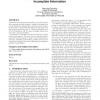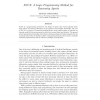1235 search results - page 83 / 247 » Formalizing information security knowledge |
108
Voted
SEMWEB
2005
Springer
15 years 7 months ago
2005
Springer
The paper reports on the formal framework to design strategies for multi-issue non-symmetric meaning negotiations among software agents in a distributed information retrieval syste...
108
click to vote
ATAL
2010
Springer
15 years 3 months ago
2010
Springer
Alternating-time Temporal Logic (ATL) [1] is used to reason about strategic abilities of agents. Aiming at strategies that can realistically be implemented in software, many varia...
113
click to vote
CORR
2004
Springer
15 years 2 months ago
2004
Springer
FLUX is a programming method for the design of agents that reason logically about their actions and sensor information in the presence of incomplete knowledge. The core of FLUX is...
101
Voted
IJCAI
1993
15 years 3 months ago
1993
The problem of representing and reasoning about two notions of time that are relevant in the context of knowledge bases is addressed. These are called historical time and belief t...
AEI
2010
15 years 2 months ago
2010
nizing multiple forms of information and knowledge processing on different levels of abstraction in a structured and principled manner. We propose knowledge processing middleware a...


